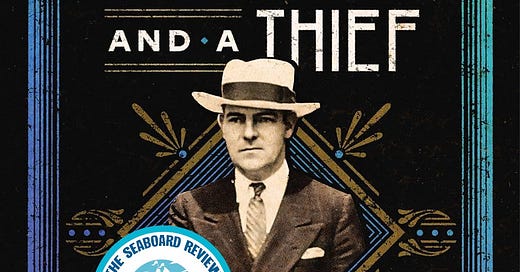The Daring Jewel Heists of a Jazz-Age Rogue: A Gentleman and A Thief by Dean Jobb
Review by James M. Fisher
“Dean Jobb has long been a master of narrative nonfiction, rummaging through the past to uncover lost gems of history. And in this mesmerizing tale about a Jazz Age gentlemanly thief, Jobb has found his own perfect jewel.” — David Grann, #1 NY Times bestselling author of The Wager and Killers of the Flower Moon
Great praise from David Grann, an author that I consider to be the US counterpart of Dean Jobb, who hails from Halifax, Nova Scotia. His new book, A Gentleman and a Thief1, comes hot on the heels of his previous book, The Case of the Murderous Dr. Cream: The Hunt for a Victorian Era Serial Killer (HarperAvenue, 2021) of which I said: “This is a true-crime lover’s dream of a book. Highly recommended.”
I can say the same about A Gentleman and a Thief. The items that made that book such a “dream” can be said here: told at a good clip, meticulously researched and with photos to enhance the story.
And what a story it is!
Arthur Barry, of humble beginnings in Worchester, Massachusetts, rises to the top of New York City’s “Gatsby era” elite via clever deception, gaining their trust and scoping out opportunities to break in and steal their jewelry. Foremost, he learns the layout of their homes, especially the second floor, where the bedrooms are, for where the bedrooms are, so their jewels are kept after removing them before retiring for the night. Then, under cover of darkness, he uses a ladder2 to gain entry through an unlocked window to quietly rifle through dresser drawers while his victims sleep inches away. If they awake, Barry calmly reassures them he is not there to harm them, only to take their jewels.
Most homeowners were not as careful with their jewelry. Barry often found expensive pieces left on the tops of dressers and bureaus. If they had been put away, his best bet was to slide open the top right-hand drawer of the dressing table in the master bedroom. "Nine out of ten times." he noted, "that's the spot where I've found the whole haul." His advice to homeowners looking for a safe place to stash their valuables? "Hide your jewels in the kitchen.'"
He proceeds to rob them and then gets away long before the police can be alerted. He does this repeatedly, over and over, moving from one high-class neighbourhood to another, always eluding the police and fencing his booty, using the money to finance his illusion of being a “moneyed” person of note in Jazz-age New York City.
This book is not just about Arthur Barry (and his many aliases), but a time capsule of the so-called Jazz Age3 when prohibition was the law, the time of the speakeasy, bathtub gin, gambling and the nouveau riche capitalists building their mansions on Long Island. The times are perfectly caught in F. Scott Fitzgerald’s novel The Great Gatsby and Mr. Jobb supplies even more detail as he writes not only of the grand mansions, lavish parties, and the pearls and jewels worn by the wives of successful businessmen but also of the other side of crime, the archaic jails and prisons of the time4 and what life was like behind bars, as Barry was eventually caught (and escaped, living as a fugitive for three years). Mr. Jobb provides extensive endnotes and a list of Arthur Barry’s major heists.
Overall, a well-developed historical true crime story showcasing Mr. Jobb’s mastery of the genre, that has resulted in his international acclaim. Moreover, he has informed his Twitter (X) followers of his next title, Murder in the Cards, A Scandalous Life, A Mysterious Death, and the Turbulent Dawn of the Jazz Age, slated for late 2027.
It will seem like a long wait for this Dean Jobb fan.
About the Author
DEAN JOBB is a professor in the master of fine arts in creative non-fiction program at the University of King’s College in Halifax, Nova Scotia. His website is here.
Book Details
Publisher : HarperCollins Publishers (June 4 2024)
Language : English
Paperback : 448 pages
ISBN-10 : 1443468533
ISBN-13 : 978-1443468534
Available June 1, 2024.
Never his own, he typically locates one on the property. He always wears gloves, so no fingerprints are left.
The 1920s and 1930s, post WWI and pre-WWII.






